Employability Skills Report: Assistant Manager's Role at Travelodge
VerifiedAdded on 2020/10/05
|17
|5125
|76
Report
AI Summary
This report analyzes the employability skills required for an assistant manager role within the Travelodge hotel chain. The report begins with an introduction to employability skills, emphasizing their importance in securing employment and boosting workforce performance. It then delves into the assistant manager's responsibilities, utilizing the SMART tool to define objectives and performance metrics, with a focus on communication, decision-making, and time management. The report evaluates the effectiveness of these skills through appraisal systems and recommends areas for improvement, including planning, communication, self-management, and technology skills. Motivational techniques, such as Maslow's hierarchy of needs and Theories X and Y, are discussed to improve employee performance. The report also addresses work-based problems like employee retention and communication gaps, proposing solutions such as team meetings and training programs. Different communication styles, including verbal and non-verbal methods, are explored, along with the use of formal and informal feedback mechanisms. Finally, a memo to the senior manager highlights key issues and proposed solutions for enhancing the hotel's performance.
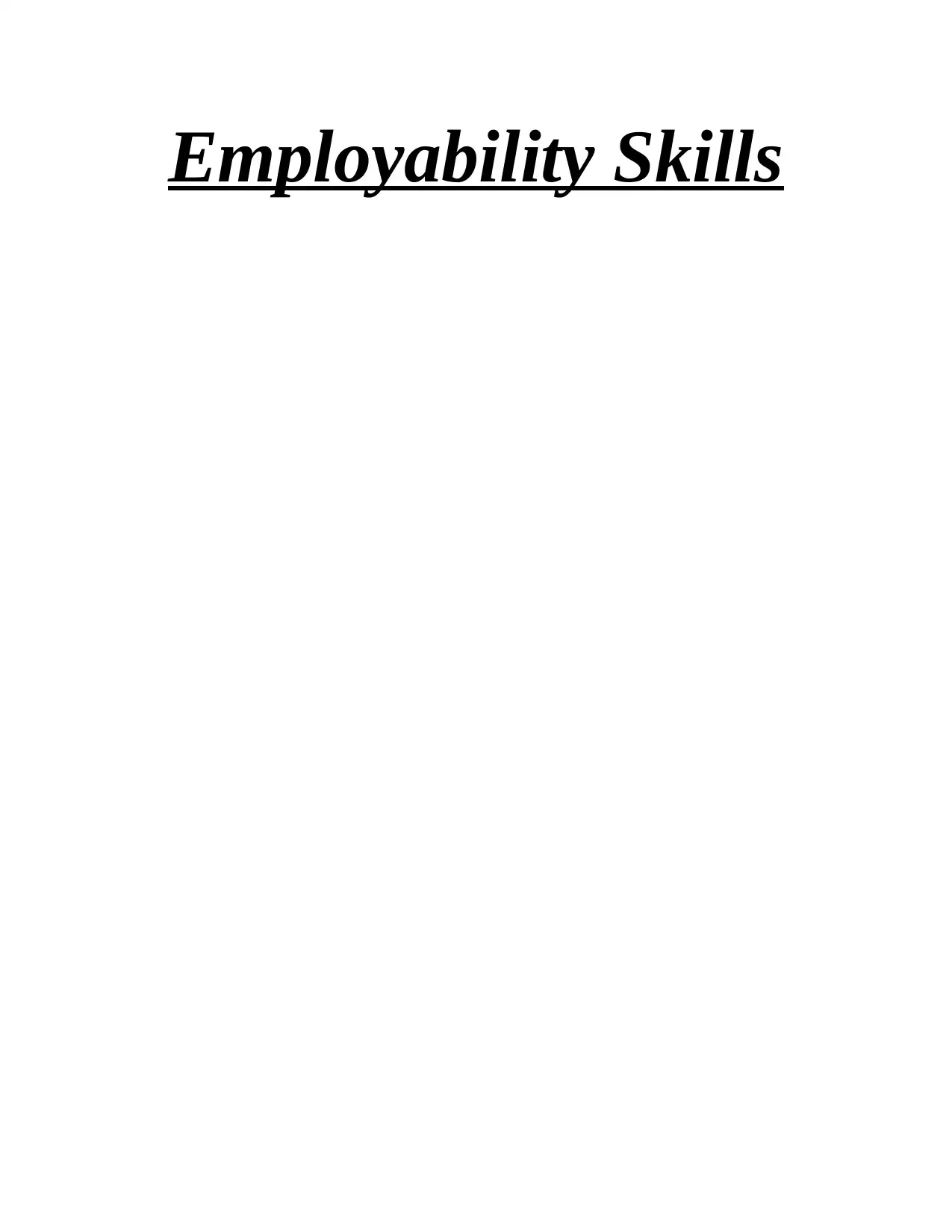
Employability Skills
Paraphrase This Document
Need a fresh take? Get an instant paraphrase of this document with our AI Paraphraser
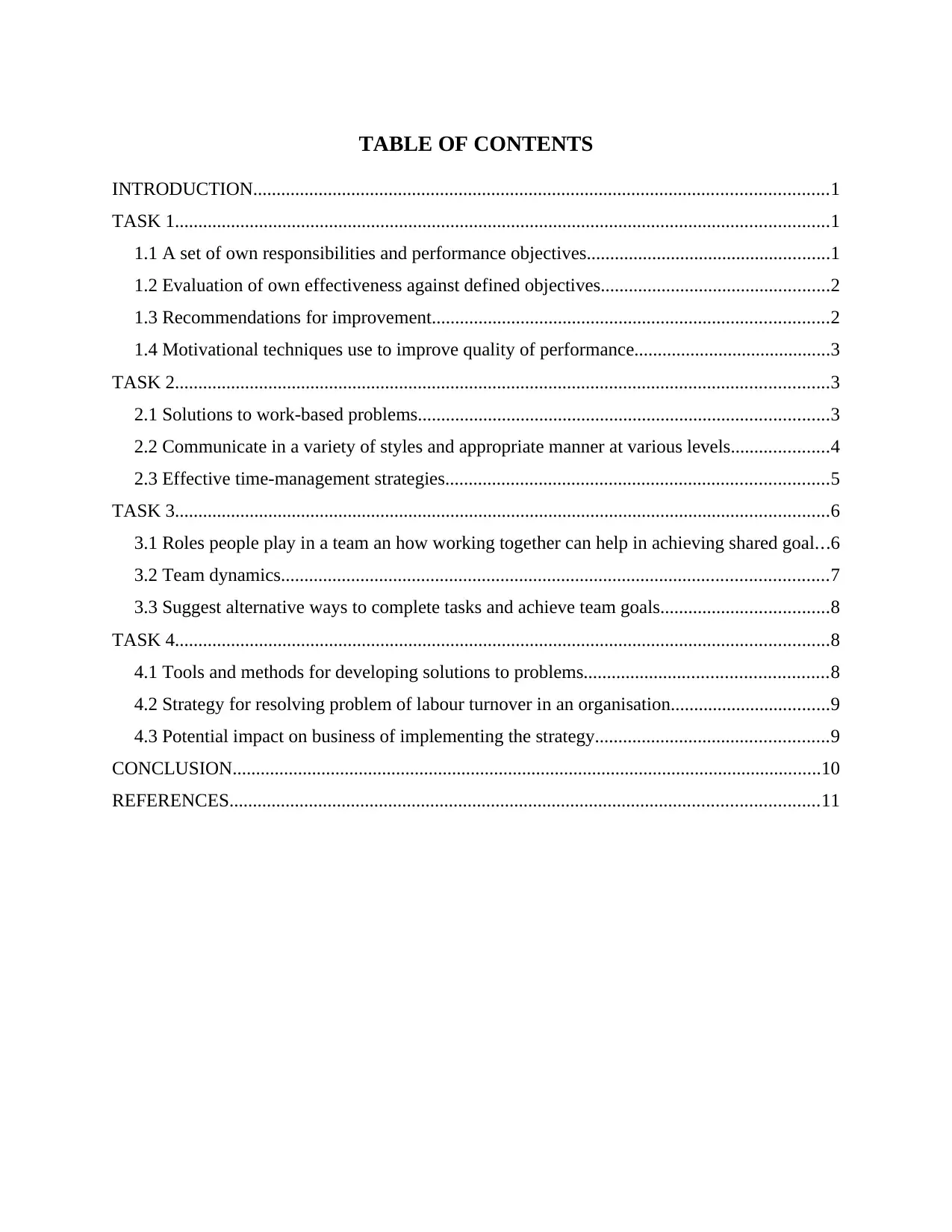
TABLE OF CONTENTS
INTRODUCTION...........................................................................................................................1
TASK 1............................................................................................................................................1
1.1 A set of own responsibilities and performance objectives....................................................1
1.2 Evaluation of own effectiveness against defined objectives.................................................2
1.3 Recommendations for improvement.....................................................................................2
1.4 Motivational techniques use to improve quality of performance..........................................3
TASK 2............................................................................................................................................3
2.1 Solutions to work-based problems........................................................................................3
2.2 Communicate in a variety of styles and appropriate manner at various levels.....................4
2.3 Effective time-management strategies..................................................................................5
TASK 3............................................................................................................................................6
3.1 Roles people play in a team an how working together can help in achieving shared goal...6
3.2 Team dynamics.....................................................................................................................7
3.3 Suggest alternative ways to complete tasks and achieve team goals....................................8
TASK 4............................................................................................................................................8
4.1 Tools and methods for developing solutions to problems....................................................8
4.2 Strategy for resolving problem of labour turnover in an organisation..................................9
4.3 Potential impact on business of implementing the strategy..................................................9
CONCLUSION..............................................................................................................................10
REFERENCES..............................................................................................................................11
INTRODUCTION...........................................................................................................................1
TASK 1............................................................................................................................................1
1.1 A set of own responsibilities and performance objectives....................................................1
1.2 Evaluation of own effectiveness against defined objectives.................................................2
1.3 Recommendations for improvement.....................................................................................2
1.4 Motivational techniques use to improve quality of performance..........................................3
TASK 2............................................................................................................................................3
2.1 Solutions to work-based problems........................................................................................3
2.2 Communicate in a variety of styles and appropriate manner at various levels.....................4
2.3 Effective time-management strategies..................................................................................5
TASK 3............................................................................................................................................6
3.1 Roles people play in a team an how working together can help in achieving shared goal...6
3.2 Team dynamics.....................................................................................................................7
3.3 Suggest alternative ways to complete tasks and achieve team goals....................................8
TASK 4............................................................................................................................................8
4.1 Tools and methods for developing solutions to problems....................................................8
4.2 Strategy for resolving problem of labour turnover in an organisation..................................9
4.3 Potential impact on business of implementing the strategy..................................................9
CONCLUSION..............................................................................................................................10
REFERENCES..............................................................................................................................11

⊘ This is a preview!⊘
Do you want full access?
Subscribe today to unlock all pages.

Trusted by 1+ million students worldwide
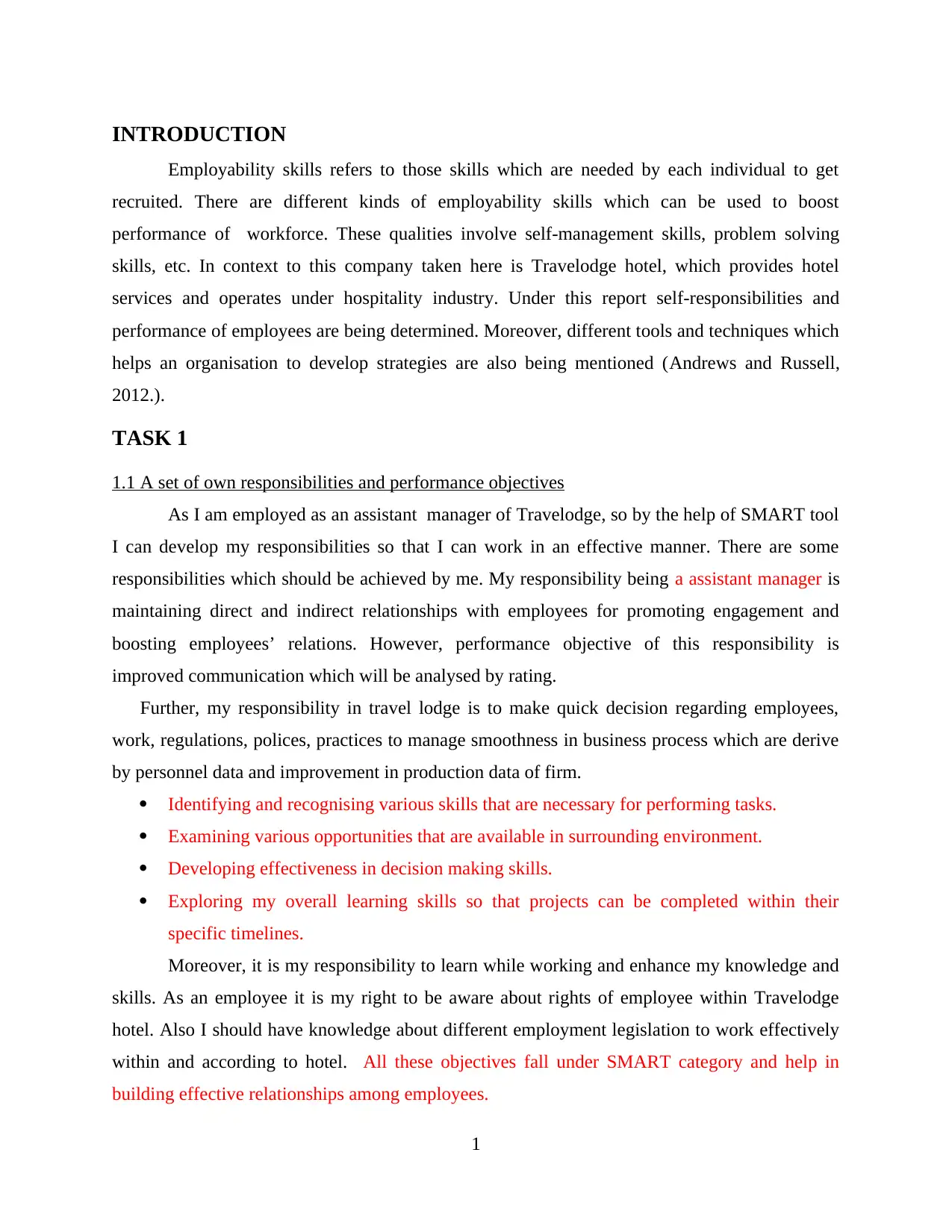
INTRODUCTION
Employability skills refers to those skills which are needed by each individual to get
recruited. There are different kinds of employability skills which can be used to boost
performance of workforce. These qualities involve self-management skills, problem solving
skills, etc. In context to this company taken here is Travelodge hotel, which provides hotel
services and operates under hospitality industry. Under this report self-responsibilities and
performance of employees are being determined. Moreover, different tools and techniques which
helps an organisation to develop strategies are also being mentioned (Andrews and Russell,
2012.).
TASK 1
1.1 A set of own responsibilities and performance objectives
As I am employed as an assistant manager of Travelodge, so by the help of SMART tool
I can develop my responsibilities so that I can work in an effective manner. There are some
responsibilities which should be achieved by me. My responsibility being a assistant manager is
maintaining direct and indirect relationships with employees for promoting engagement and
boosting employees’ relations. However, performance objective of this responsibility is
improved communication which will be analysed by rating.
Further, my responsibility in travel lodge is to make quick decision regarding employees,
work, regulations, polices, practices to manage smoothness in business process which are derive
by personnel data and improvement in production data of firm.
Identifying and recognising various skills that are necessary for performing tasks.
Examining various opportunities that are available in surrounding environment.
Developing effectiveness in decision making skills.
Exploring my overall learning skills so that projects can be completed within their
specific timelines.
Moreover, it is my responsibility to learn while working and enhance my knowledge and
skills. As an employee it is my right to be aware about rights of employee within Travelodge
hotel. Also I should have knowledge about different employment legislation to work effectively
within and according to hotel. All these objectives fall under SMART category and help in
building effective relationships among employees.
1
Employability skills refers to those skills which are needed by each individual to get
recruited. There are different kinds of employability skills which can be used to boost
performance of workforce. These qualities involve self-management skills, problem solving
skills, etc. In context to this company taken here is Travelodge hotel, which provides hotel
services and operates under hospitality industry. Under this report self-responsibilities and
performance of employees are being determined. Moreover, different tools and techniques which
helps an organisation to develop strategies are also being mentioned (Andrews and Russell,
2012.).
TASK 1
1.1 A set of own responsibilities and performance objectives
As I am employed as an assistant manager of Travelodge, so by the help of SMART tool
I can develop my responsibilities so that I can work in an effective manner. There are some
responsibilities which should be achieved by me. My responsibility being a assistant manager is
maintaining direct and indirect relationships with employees for promoting engagement and
boosting employees’ relations. However, performance objective of this responsibility is
improved communication which will be analysed by rating.
Further, my responsibility in travel lodge is to make quick decision regarding employees,
work, regulations, polices, practices to manage smoothness in business process which are derive
by personnel data and improvement in production data of firm.
Identifying and recognising various skills that are necessary for performing tasks.
Examining various opportunities that are available in surrounding environment.
Developing effectiveness in decision making skills.
Exploring my overall learning skills so that projects can be completed within their
specific timelines.
Moreover, it is my responsibility to learn while working and enhance my knowledge and
skills. As an employee it is my right to be aware about rights of employee within Travelodge
hotel. Also I should have knowledge about different employment legislation to work effectively
within and according to hotel. All these objectives fall under SMART category and help in
building effective relationships among employees.
1
Paraphrase This Document
Need a fresh take? Get an instant paraphrase of this document with our AI Paraphraser
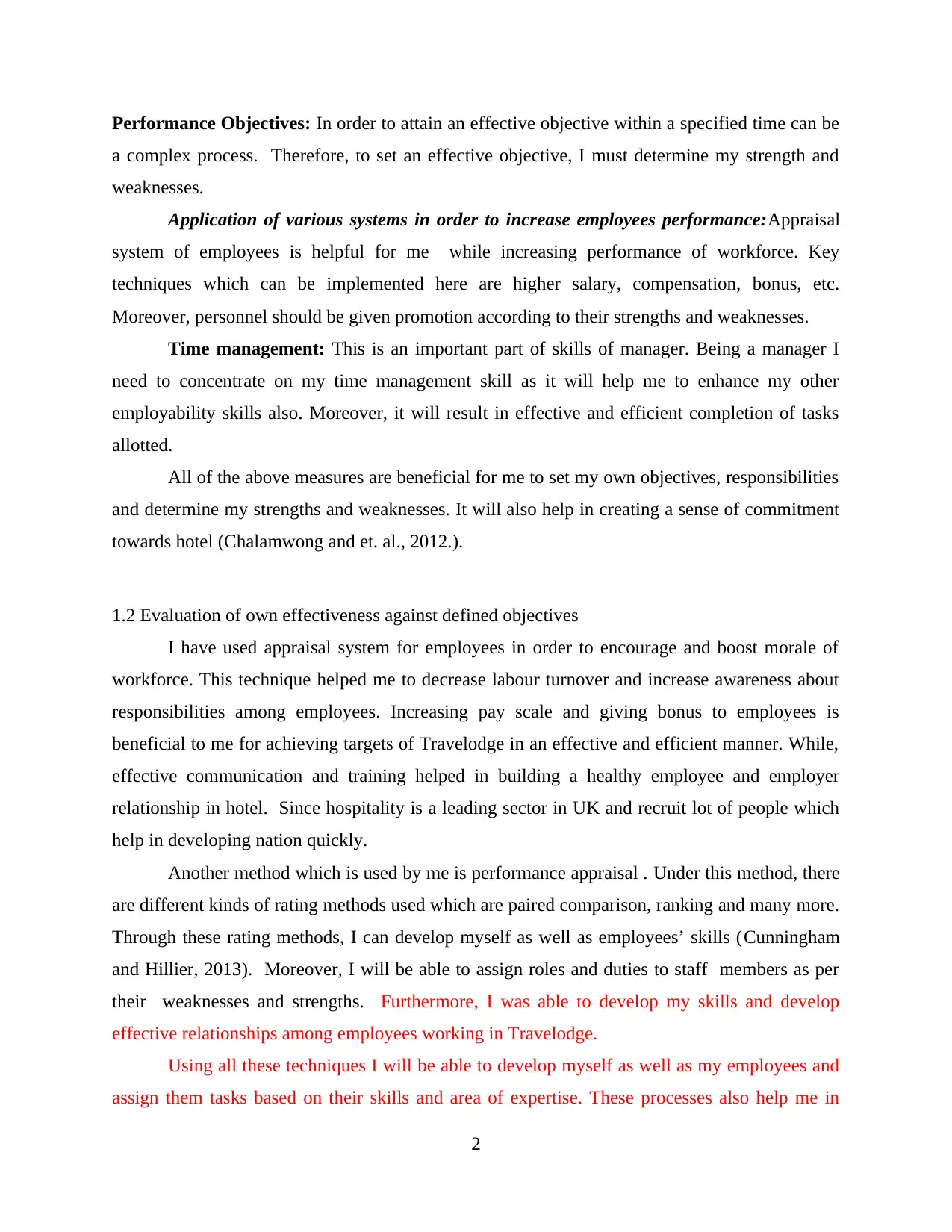
Performance Objectives: In order to attain an effective objective within a specified time can be
a complex process. Therefore, to set an effective objective, I must determine my strength and
weaknesses.
Application of various systems in order to increase employees performance:Appraisal
system of employees is helpful for me while increasing performance of workforce. Key
techniques which can be implemented here are higher salary, compensation, bonus, etc.
Moreover, personnel should be given promotion according to their strengths and weaknesses.
Time management: This is an important part of skills of manager. Being a manager I
need to concentrate on my time management skill as it will help me to enhance my other
employability skills also. Moreover, it will result in effective and efficient completion of tasks
allotted.
All of the above measures are beneficial for me to set my own objectives, responsibilities
and determine my strengths and weaknesses. It will also help in creating a sense of commitment
towards hotel (Chalamwong and et. al., 2012.).
1.2 Evaluation of own effectiveness against defined objectives
I have used appraisal system for employees in order to encourage and boost morale of
workforce. This technique helped me to decrease labour turnover and increase awareness about
responsibilities among employees. Increasing pay scale and giving bonus to employees is
beneficial to me for achieving targets of Travelodge in an effective and efficient manner. While,
effective communication and training helped in building a healthy employee and employer
relationship in hotel. Since hospitality is a leading sector in UK and recruit lot of people which
help in developing nation quickly.
Another method which is used by me is performance appraisal . Under this method, there
are different kinds of rating methods used which are paired comparison, ranking and many more.
Through these rating methods, I can develop myself as well as employees’ skills (Cunningham
and Hillier, 2013). Moreover, I will be able to assign roles and duties to staff members as per
their weaknesses and strengths. Furthermore, I was able to develop my skills and develop
effective relationships among employees working in Travelodge.
Using all these techniques I will be able to develop myself as well as my employees and
assign them tasks based on their skills and area of expertise. These processes also help me in
2
a complex process. Therefore, to set an effective objective, I must determine my strength and
weaknesses.
Application of various systems in order to increase employees performance:Appraisal
system of employees is helpful for me while increasing performance of workforce. Key
techniques which can be implemented here are higher salary, compensation, bonus, etc.
Moreover, personnel should be given promotion according to their strengths and weaknesses.
Time management: This is an important part of skills of manager. Being a manager I
need to concentrate on my time management skill as it will help me to enhance my other
employability skills also. Moreover, it will result in effective and efficient completion of tasks
allotted.
All of the above measures are beneficial for me to set my own objectives, responsibilities
and determine my strengths and weaknesses. It will also help in creating a sense of commitment
towards hotel (Chalamwong and et. al., 2012.).
1.2 Evaluation of own effectiveness against defined objectives
I have used appraisal system for employees in order to encourage and boost morale of
workforce. This technique helped me to decrease labour turnover and increase awareness about
responsibilities among employees. Increasing pay scale and giving bonus to employees is
beneficial to me for achieving targets of Travelodge in an effective and efficient manner. While,
effective communication and training helped in building a healthy employee and employer
relationship in hotel. Since hospitality is a leading sector in UK and recruit lot of people which
help in developing nation quickly.
Another method which is used by me is performance appraisal . Under this method, there
are different kinds of rating methods used which are paired comparison, ranking and many more.
Through these rating methods, I can develop myself as well as employees’ skills (Cunningham
and Hillier, 2013). Moreover, I will be able to assign roles and duties to staff members as per
their weaknesses and strengths. Furthermore, I was able to develop my skills and develop
effective relationships among employees working in Travelodge.
Using all these techniques I will be able to develop myself as well as my employees and
assign them tasks based on their skills and area of expertise. These processes also help me in
2
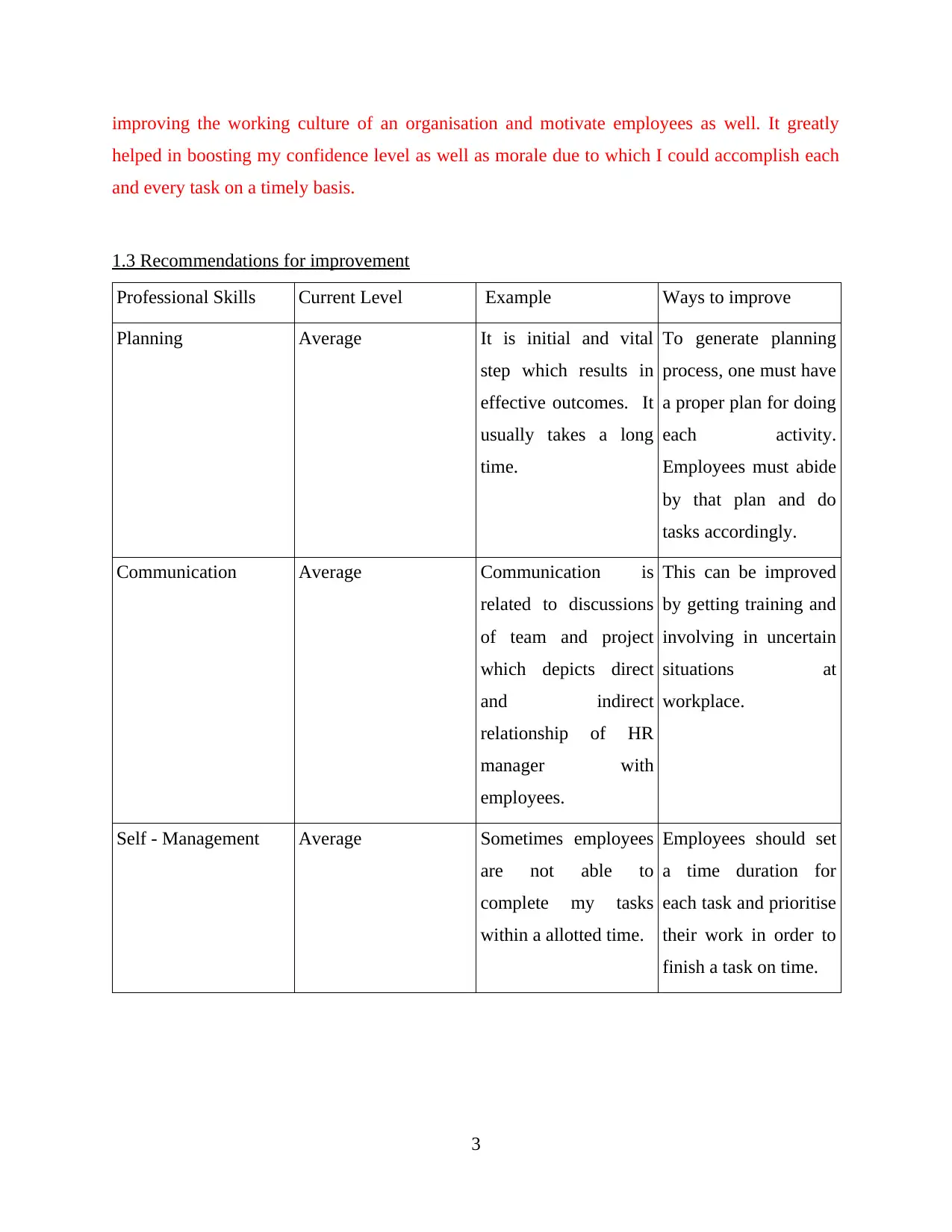
improving the working culture of an organisation and motivate employees as well. It greatly
helped in boosting my confidence level as well as morale due to which I could accomplish each
and every task on a timely basis.
1.3 Recommendations for improvement
Professional Skills Current Level Example Ways to improve
Planning Average It is initial and vital
step which results in
effective outcomes. It
usually takes a long
time.
To generate planning
process, one must have
a proper plan for doing
each activity.
Employees must abide
by that plan and do
tasks accordingly.
Communication Average Communication is
related to discussions
of team and project
which depicts direct
and indirect
relationship of HR
manager with
employees.
This can be improved
by getting training and
involving in uncertain
situations at
workplace.
Self - Management Average Sometimes employees
are not able to
complete my tasks
within a allotted time.
Employees should set
a time duration for
each task and prioritise
their work in order to
finish a task on time.
3
helped in boosting my confidence level as well as morale due to which I could accomplish each
and every task on a timely basis.
1.3 Recommendations for improvement
Professional Skills Current Level Example Ways to improve
Planning Average It is initial and vital
step which results in
effective outcomes. It
usually takes a long
time.
To generate planning
process, one must have
a proper plan for doing
each activity.
Employees must abide
by that plan and do
tasks accordingly.
Communication Average Communication is
related to discussions
of team and project
which depicts direct
and indirect
relationship of HR
manager with
employees.
This can be improved
by getting training and
involving in uncertain
situations at
workplace.
Self - Management Average Sometimes employees
are not able to
complete my tasks
within a allotted time.
Employees should set
a time duration for
each task and prioritise
their work in order to
finish a task on time.
3
⊘ This is a preview!⊘
Do you want full access?
Subscribe today to unlock all pages.

Trusted by 1+ million students worldwide
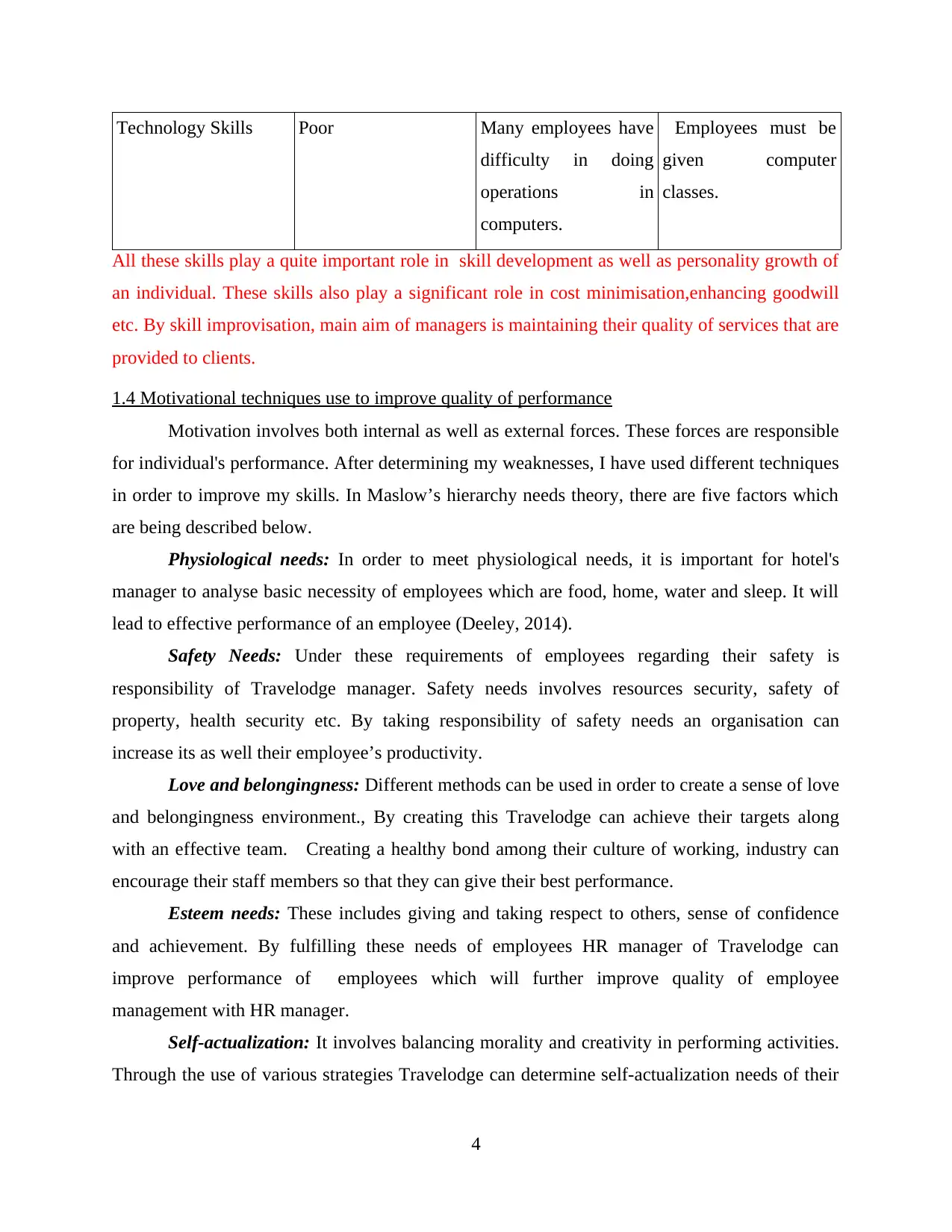
Technology Skills Poor Many employees have
difficulty in doing
operations in
computers.
Employees must be
given computer
classes.
All these skills play a quite important role in skill development as well as personality growth of
an individual. These skills also play a significant role in cost minimisation,enhancing goodwill
etc. By skill improvisation, main aim of managers is maintaining their quality of services that are
provided to clients.
1.4 Motivational techniques use to improve quality of performance
Motivation involves both internal as well as external forces. These forces are responsible
for individual's performance. After determining my weaknesses, I have used different techniques
in order to improve my skills. In Maslow’s hierarchy needs theory, there are five factors which
are being described below.
Physiological needs: In order to meet physiological needs, it is important for hotel's
manager to analyse basic necessity of employees which are food, home, water and sleep. It will
lead to effective performance of an employee (Deeley, 2014).
Safety Needs: Under these requirements of employees regarding their safety is
responsibility of Travelodge manager. Safety needs involves resources security, safety of
property, health security etc. By taking responsibility of safety needs an organisation can
increase its as well their employee’s productivity.
Love and belongingness: Different methods can be used in order to create a sense of love
and belongingness environment., By creating this Travelodge can achieve their targets along
with an effective team. Creating a healthy bond among their culture of working, industry can
encourage their staff members so that they can give their best performance.
Esteem needs: These includes giving and taking respect to others, sense of confidence
and achievement. By fulfilling these needs of employees HR manager of Travelodge can
improve performance of employees which will further improve quality of employee
management with HR manager.
Self-actualization: It involves balancing morality and creativity in performing activities.
Through the use of various strategies Travelodge can determine self-actualization needs of their
4
difficulty in doing
operations in
computers.
Employees must be
given computer
classes.
All these skills play a quite important role in skill development as well as personality growth of
an individual. These skills also play a significant role in cost minimisation,enhancing goodwill
etc. By skill improvisation, main aim of managers is maintaining their quality of services that are
provided to clients.
1.4 Motivational techniques use to improve quality of performance
Motivation involves both internal as well as external forces. These forces are responsible
for individual's performance. After determining my weaknesses, I have used different techniques
in order to improve my skills. In Maslow’s hierarchy needs theory, there are five factors which
are being described below.
Physiological needs: In order to meet physiological needs, it is important for hotel's
manager to analyse basic necessity of employees which are food, home, water and sleep. It will
lead to effective performance of an employee (Deeley, 2014).
Safety Needs: Under these requirements of employees regarding their safety is
responsibility of Travelodge manager. Safety needs involves resources security, safety of
property, health security etc. By taking responsibility of safety needs an organisation can
increase its as well their employee’s productivity.
Love and belongingness: Different methods can be used in order to create a sense of love
and belongingness environment., By creating this Travelodge can achieve their targets along
with an effective team. Creating a healthy bond among their culture of working, industry can
encourage their staff members so that they can give their best performance.
Esteem needs: These includes giving and taking respect to others, sense of confidence
and achievement. By fulfilling these needs of employees HR manager of Travelodge can
improve performance of employees which will further improve quality of employee
management with HR manager.
Self-actualization: It involves balancing morality and creativity in performing activities.
Through the use of various strategies Travelodge can determine self-actualization needs of their
4
Paraphrase This Document
Need a fresh take? Get an instant paraphrase of this document with our AI Paraphraser
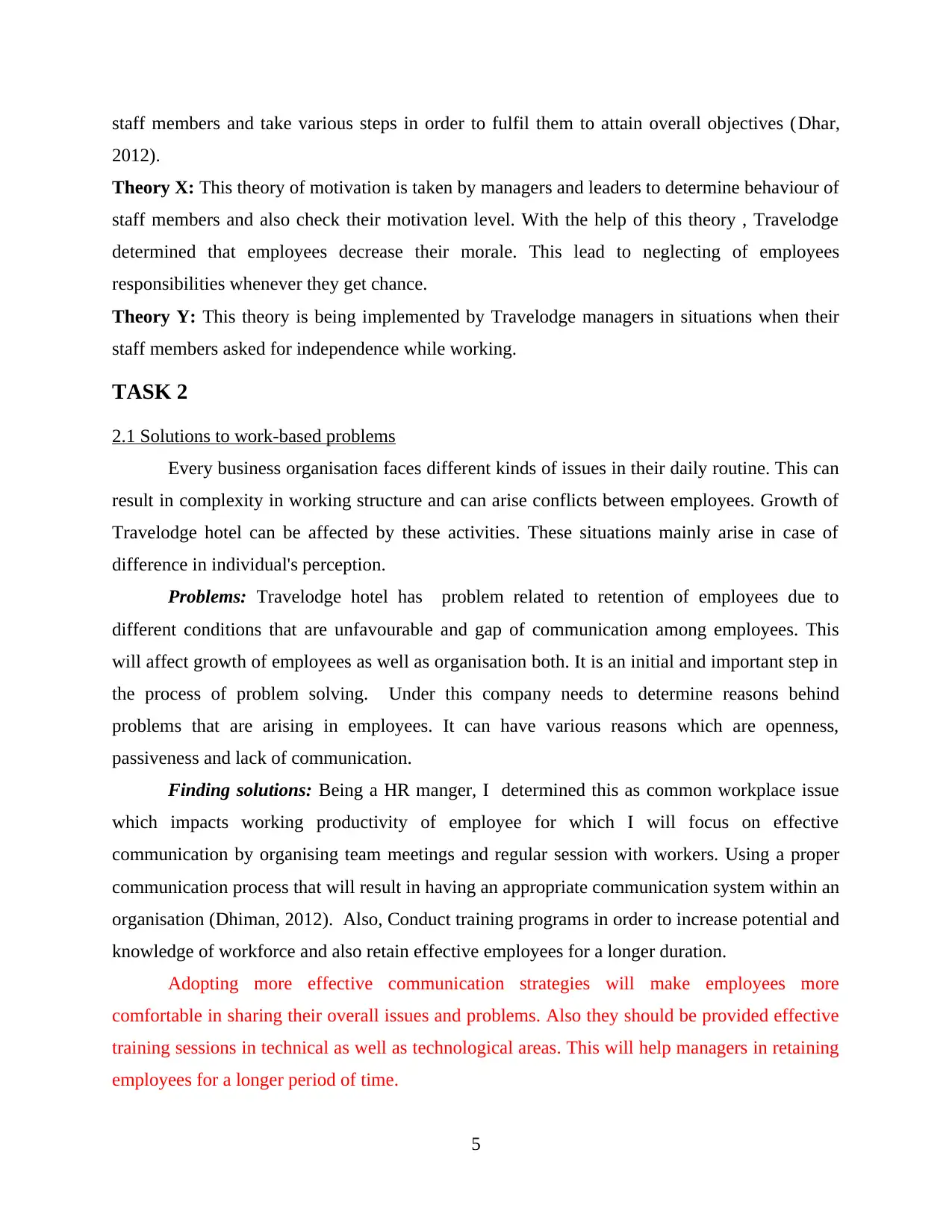
staff members and take various steps in order to fulfil them to attain overall objectives ( Dhar,
2012).
Theory X: This theory of motivation is taken by managers and leaders to determine behaviour of
staff members and also check their motivation level. With the help of this theory , Travelodge
determined that employees decrease their morale. This lead to neglecting of employees
responsibilities whenever they get chance.
Theory Y: This theory is being implemented by Travelodge managers in situations when their
staff members asked for independence while working.
TASK 2
2.1 Solutions to work-based problems
Every business organisation faces different kinds of issues in their daily routine. This can
result in complexity in working structure and can arise conflicts between employees. Growth of
Travelodge hotel can be affected by these activities. These situations mainly arise in case of
difference in individual's perception.
Problems: Travelodge hotel has problem related to retention of employees due to
different conditions that are unfavourable and gap of communication among employees. This
will affect growth of employees as well as organisation both. It is an initial and important step in
the process of problem solving. Under this company needs to determine reasons behind
problems that are arising in employees. It can have various reasons which are openness,
passiveness and lack of communication.
Finding solutions: Being a HR manger, I determined this as common workplace issue
which impacts working productivity of employee for which I will focus on effective
communication by organising team meetings and regular session with workers. Using a proper
communication process that will result in having an appropriate communication system within an
organisation (Dhiman, 2012). Also, Conduct training programs in order to increase potential and
knowledge of workforce and also retain effective employees for a longer duration.
Adopting more effective communication strategies will make employees more
comfortable in sharing their overall issues and problems. Also they should be provided effective
training sessions in technical as well as technological areas. This will help managers in retaining
employees for a longer period of time.
5
2012).
Theory X: This theory of motivation is taken by managers and leaders to determine behaviour of
staff members and also check their motivation level. With the help of this theory , Travelodge
determined that employees decrease their morale. This lead to neglecting of employees
responsibilities whenever they get chance.
Theory Y: This theory is being implemented by Travelodge managers in situations when their
staff members asked for independence while working.
TASK 2
2.1 Solutions to work-based problems
Every business organisation faces different kinds of issues in their daily routine. This can
result in complexity in working structure and can arise conflicts between employees. Growth of
Travelodge hotel can be affected by these activities. These situations mainly arise in case of
difference in individual's perception.
Problems: Travelodge hotel has problem related to retention of employees due to
different conditions that are unfavourable and gap of communication among employees. This
will affect growth of employees as well as organisation both. It is an initial and important step in
the process of problem solving. Under this company needs to determine reasons behind
problems that are arising in employees. It can have various reasons which are openness,
passiveness and lack of communication.
Finding solutions: Being a HR manger, I determined this as common workplace issue
which impacts working productivity of employee for which I will focus on effective
communication by organising team meetings and regular session with workers. Using a proper
communication process that will result in having an appropriate communication system within an
organisation (Dhiman, 2012). Also, Conduct training programs in order to increase potential and
knowledge of workforce and also retain effective employees for a longer duration.
Adopting more effective communication strategies will make employees more
comfortable in sharing their overall issues and problems. Also they should be provided effective
training sessions in technical as well as technological areas. This will help managers in retaining
employees for a longer period of time.
5
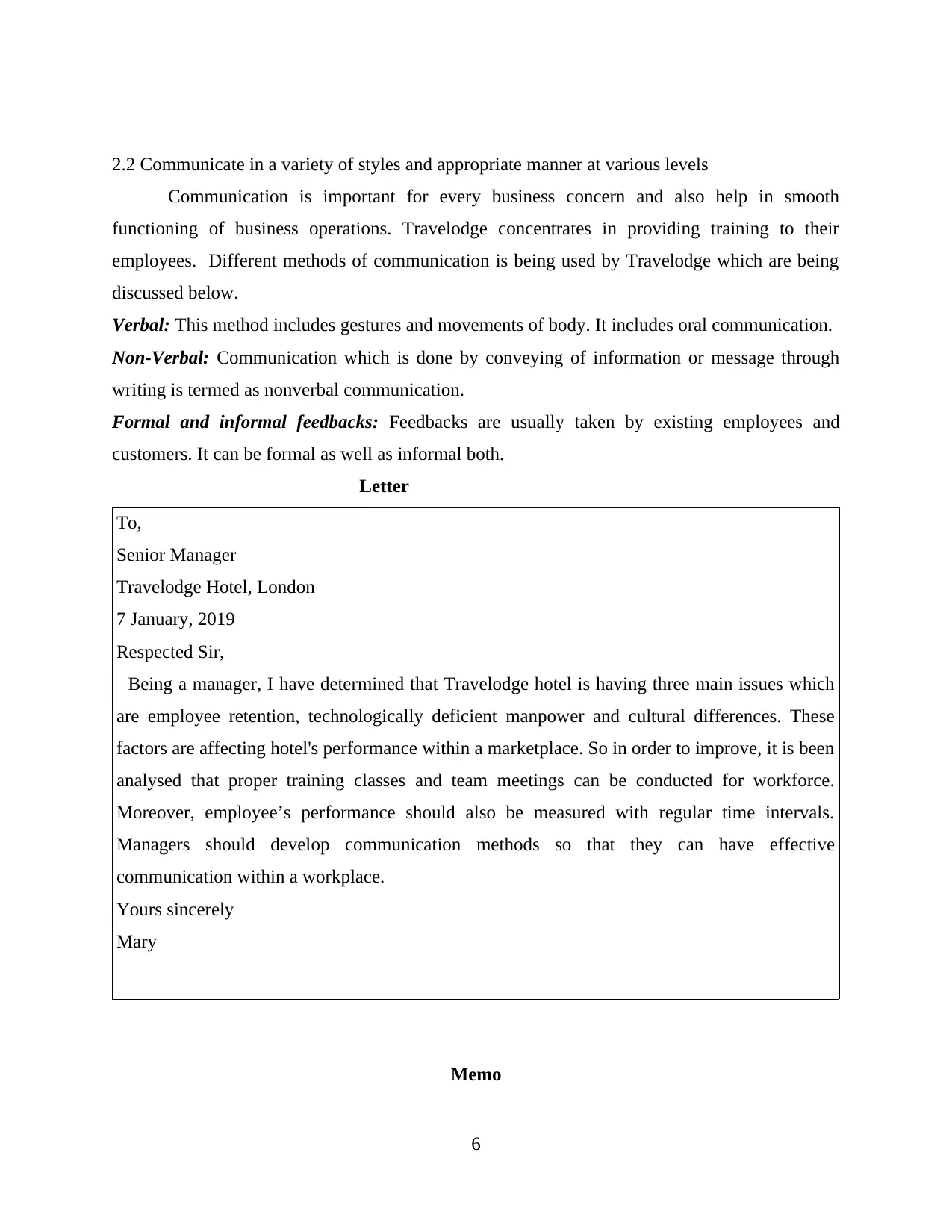
2.2 Communicate in a variety of styles and appropriate manner at various levels
Communication is important for every business concern and also help in smooth
functioning of business operations. Travelodge concentrates in providing training to their
employees. Different methods of communication is being used by Travelodge which are being
discussed below.
Verbal: This method includes gestures and movements of body. It includes oral communication.
Non-Verbal: Communication which is done by conveying of information or message through
writing is termed as nonverbal communication.
Formal and informal feedbacks: Feedbacks are usually taken by existing employees and
customers. It can be formal as well as informal both.
Letter
To,
Senior Manager
Travelodge Hotel, London
7 January, 2019
Respected Sir,
Being a manager, I have determined that Travelodge hotel is having three main issues which
are employee retention, technologically deficient manpower and cultural differences. These
factors are affecting hotel's performance within a marketplace. So in order to improve, it is been
analysed that proper training classes and team meetings can be conducted for workforce.
Moreover, employee’s performance should also be measured with regular time intervals.
Managers should develop communication methods so that they can have effective
communication within a workplace.
Yours sincerely
Mary
Memo
6
Communication is important for every business concern and also help in smooth
functioning of business operations. Travelodge concentrates in providing training to their
employees. Different methods of communication is being used by Travelodge which are being
discussed below.
Verbal: This method includes gestures and movements of body. It includes oral communication.
Non-Verbal: Communication which is done by conveying of information or message through
writing is termed as nonverbal communication.
Formal and informal feedbacks: Feedbacks are usually taken by existing employees and
customers. It can be formal as well as informal both.
Letter
To,
Senior Manager
Travelodge Hotel, London
7 January, 2019
Respected Sir,
Being a manager, I have determined that Travelodge hotel is having three main issues which
are employee retention, technologically deficient manpower and cultural differences. These
factors are affecting hotel's performance within a marketplace. So in order to improve, it is been
analysed that proper training classes and team meetings can be conducted for workforce.
Moreover, employee’s performance should also be measured with regular time intervals.
Managers should develop communication methods so that they can have effective
communication within a workplace.
Yours sincerely
Mary
Memo
6
⊘ This is a preview!⊘
Do you want full access?
Subscribe today to unlock all pages.

Trusted by 1+ million students worldwide
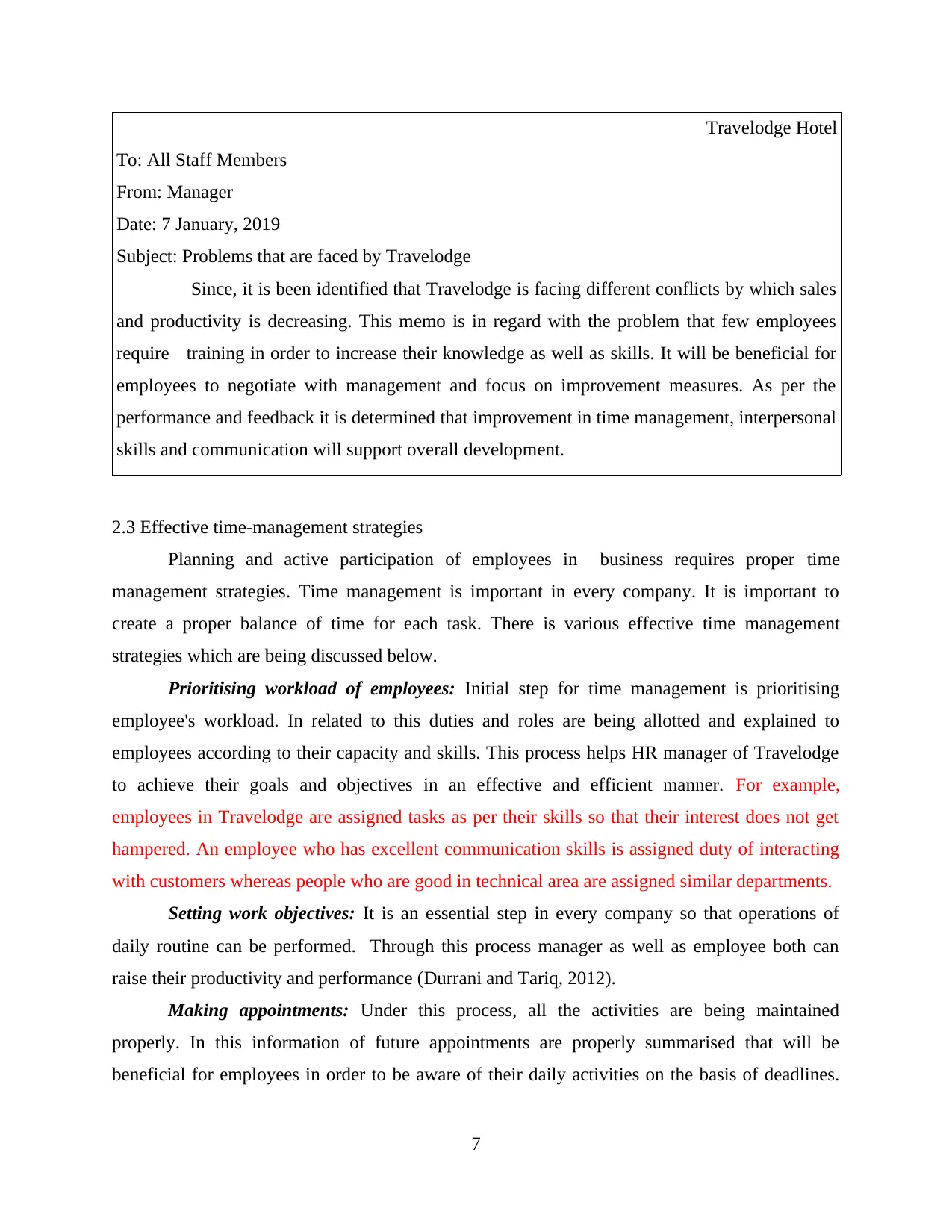
Travelodge Hotel
To: All Staff Members
From: Manager
Date: 7 January, 2019
Subject: Problems that are faced by Travelodge
Since, it is been identified that Travelodge is facing different conflicts by which sales
and productivity is decreasing. This memo is in regard with the problem that few employees
require training in order to increase their knowledge as well as skills. It will be beneficial for
employees to negotiate with management and focus on improvement measures. As per the
performance and feedback it is determined that improvement in time management, interpersonal
skills and communication will support overall development.
2.3 Effective time-management strategies
Planning and active participation of employees in business requires proper time
management strategies. Time management is important in every company. It is important to
create a proper balance of time for each task. There is various effective time management
strategies which are being discussed below.
Prioritising workload of employees: Initial step for time management is prioritising
employee's workload. In related to this duties and roles are being allotted and explained to
employees according to their capacity and skills. This process helps HR manager of Travelodge
to achieve their goals and objectives in an effective and efficient manner. For example,
employees in Travelodge are assigned tasks as per their skills so that their interest does not get
hampered. An employee who has excellent communication skills is assigned duty of interacting
with customers whereas people who are good in technical area are assigned similar departments.
Setting work objectives: It is an essential step in every company so that operations of
daily routine can be performed. Through this process manager as well as employee both can
raise their productivity and performance (Durrani and Tariq, 2012).
Making appointments: Under this process, all the activities are being maintained
properly. In this information of future appointments are properly summarised that will be
beneficial for employees in order to be aware of their daily activities on the basis of deadlines.
7
To: All Staff Members
From: Manager
Date: 7 January, 2019
Subject: Problems that are faced by Travelodge
Since, it is been identified that Travelodge is facing different conflicts by which sales
and productivity is decreasing. This memo is in regard with the problem that few employees
require training in order to increase their knowledge as well as skills. It will be beneficial for
employees to negotiate with management and focus on improvement measures. As per the
performance and feedback it is determined that improvement in time management, interpersonal
skills and communication will support overall development.
2.3 Effective time-management strategies
Planning and active participation of employees in business requires proper time
management strategies. Time management is important in every company. It is important to
create a proper balance of time for each task. There is various effective time management
strategies which are being discussed below.
Prioritising workload of employees: Initial step for time management is prioritising
employee's workload. In related to this duties and roles are being allotted and explained to
employees according to their capacity and skills. This process helps HR manager of Travelodge
to achieve their goals and objectives in an effective and efficient manner. For example,
employees in Travelodge are assigned tasks as per their skills so that their interest does not get
hampered. An employee who has excellent communication skills is assigned duty of interacting
with customers whereas people who are good in technical area are assigned similar departments.
Setting work objectives: It is an essential step in every company so that operations of
daily routine can be performed. Through this process manager as well as employee both can
raise their productivity and performance (Durrani and Tariq, 2012).
Making appointments: Under this process, all the activities are being maintained
properly. In this information of future appointments are properly summarised that will be
beneficial for employees in order to be aware of their daily activities on the basis of deadlines.
7
Paraphrase This Document
Need a fresh take? Get an instant paraphrase of this document with our AI Paraphraser
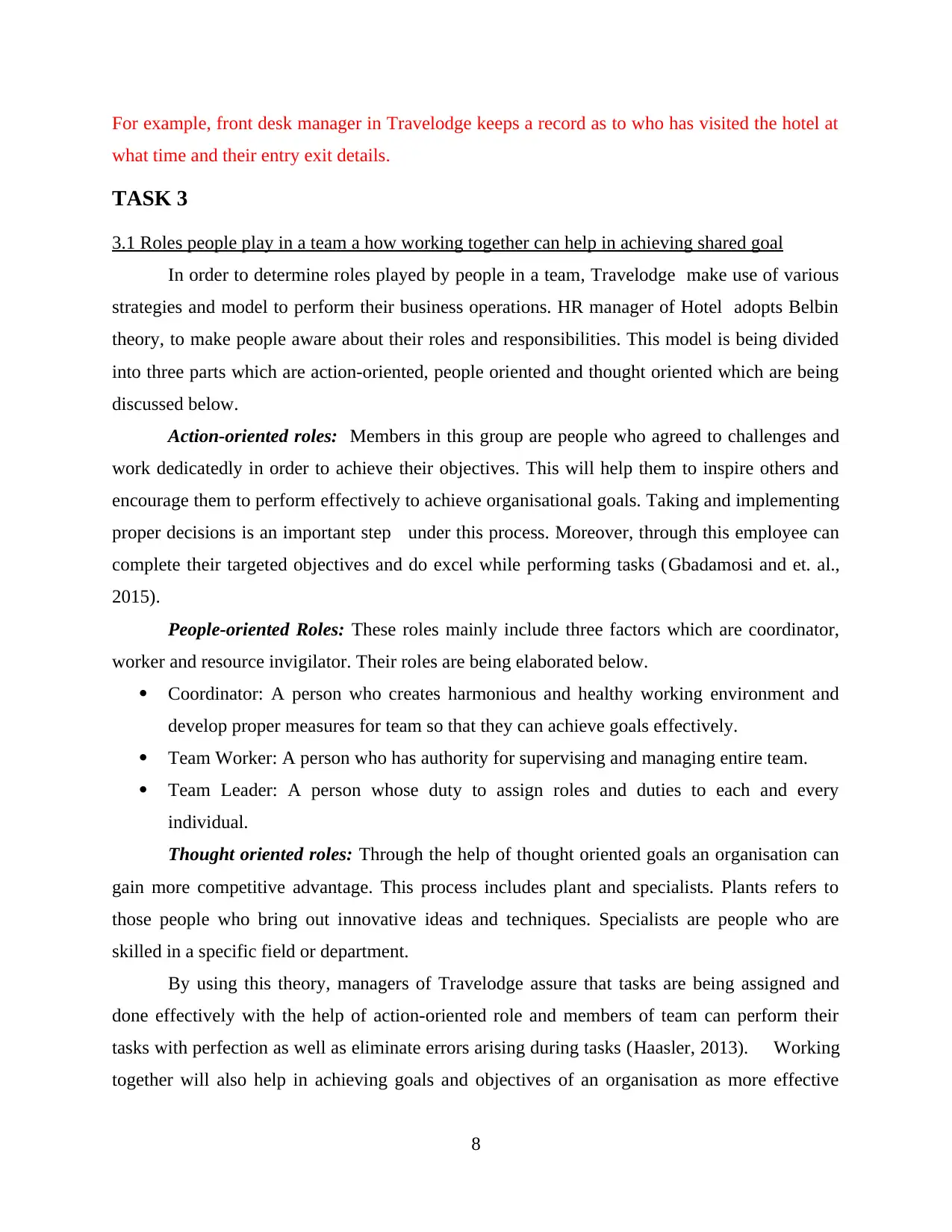
For example, front desk manager in Travelodge keeps a record as to who has visited the hotel at
what time and their entry exit details.
TASK 3
3.1 Roles people play in a team a how working together can help in achieving shared goal
In order to determine roles played by people in a team, Travelodge make use of various
strategies and model to perform their business operations. HR manager of Hotel adopts Belbin
theory, to make people aware about their roles and responsibilities. This model is being divided
into three parts which are action-oriented, people oriented and thought oriented which are being
discussed below.
Action-oriented roles: Members in this group are people who agreed to challenges and
work dedicatedly in order to achieve their objectives. This will help them to inspire others and
encourage them to perform effectively to achieve organisational goals. Taking and implementing
proper decisions is an important step under this process. Moreover, through this employee can
complete their targeted objectives and do excel while performing tasks (Gbadamosi and et. al.,
2015).
People-oriented Roles: These roles mainly include three factors which are coordinator,
worker and resource invigilator. Their roles are being elaborated below.
Coordinator: A person who creates harmonious and healthy working environment and
develop proper measures for team so that they can achieve goals effectively.
Team Worker: A person who has authority for supervising and managing entire team.
Team Leader: A person whose duty to assign roles and duties to each and every
individual.
Thought oriented roles: Through the help of thought oriented goals an organisation can
gain more competitive advantage. This process includes plant and specialists. Plants refers to
those people who bring out innovative ideas and techniques. Specialists are people who are
skilled in a specific field or department.
By using this theory, managers of Travelodge assure that tasks are being assigned and
done effectively with the help of action-oriented role and members of team can perform their
tasks with perfection as well as eliminate errors arising during tasks (Haasler, 2013). Working
together will also help in achieving goals and objectives of an organisation as more effective
8
what time and their entry exit details.
TASK 3
3.1 Roles people play in a team a how working together can help in achieving shared goal
In order to determine roles played by people in a team, Travelodge make use of various
strategies and model to perform their business operations. HR manager of Hotel adopts Belbin
theory, to make people aware about their roles and responsibilities. This model is being divided
into three parts which are action-oriented, people oriented and thought oriented which are being
discussed below.
Action-oriented roles: Members in this group are people who agreed to challenges and
work dedicatedly in order to achieve their objectives. This will help them to inspire others and
encourage them to perform effectively to achieve organisational goals. Taking and implementing
proper decisions is an important step under this process. Moreover, through this employee can
complete their targeted objectives and do excel while performing tasks (Gbadamosi and et. al.,
2015).
People-oriented Roles: These roles mainly include three factors which are coordinator,
worker and resource invigilator. Their roles are being elaborated below.
Coordinator: A person who creates harmonious and healthy working environment and
develop proper measures for team so that they can achieve goals effectively.
Team Worker: A person who has authority for supervising and managing entire team.
Team Leader: A person whose duty to assign roles and duties to each and every
individual.
Thought oriented roles: Through the help of thought oriented goals an organisation can
gain more competitive advantage. This process includes plant and specialists. Plants refers to
those people who bring out innovative ideas and techniques. Specialists are people who are
skilled in a specific field or department.
By using this theory, managers of Travelodge assure that tasks are being assigned and
done effectively with the help of action-oriented role and members of team can perform their
tasks with perfection as well as eliminate errors arising during tasks (Haasler, 2013). Working
together will also help in achieving goals and objectives of an organisation as more effective
8
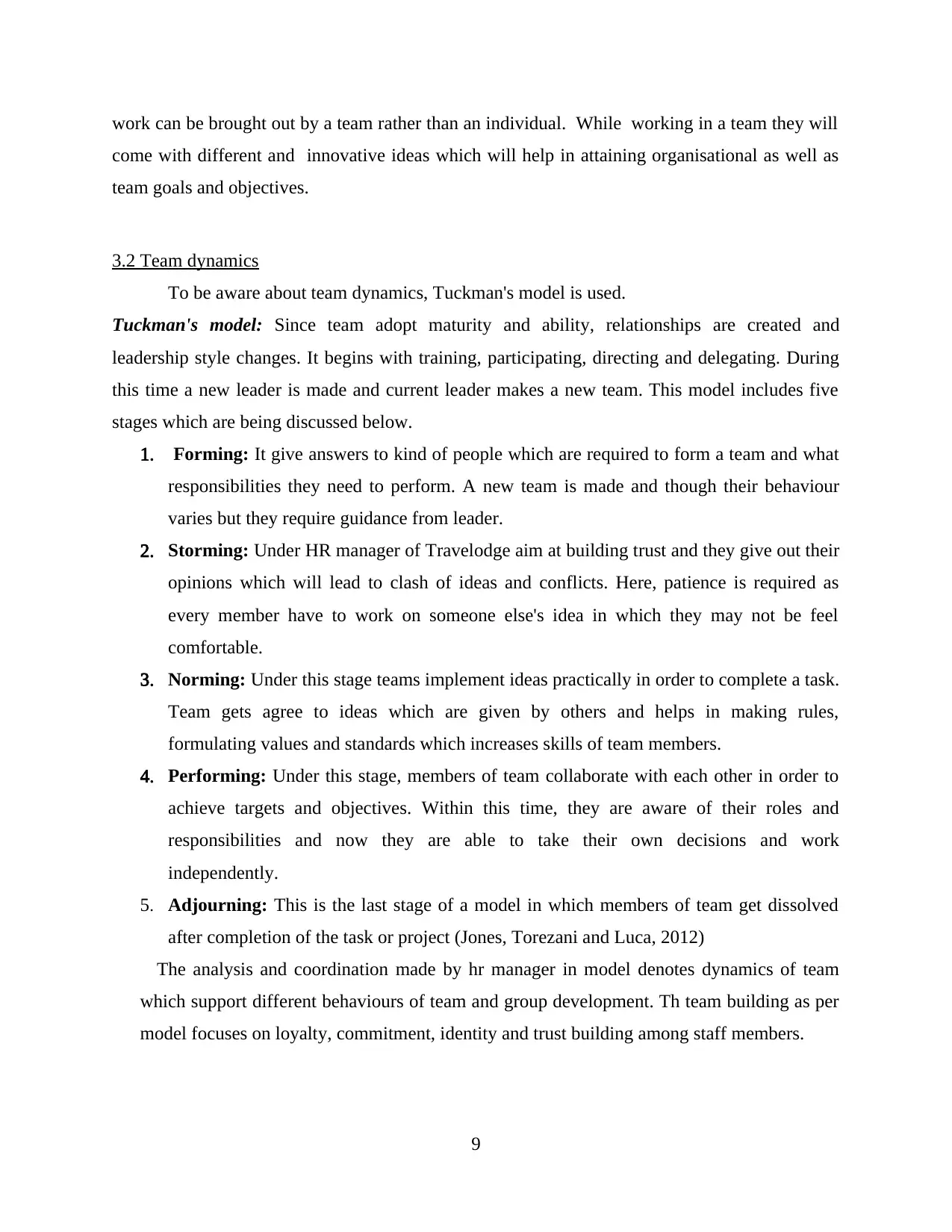
work can be brought out by a team rather than an individual. While working in a team they will
come with different and innovative ideas which will help in attaining organisational as well as
team goals and objectives.
3.2 Team dynamics
To be aware about team dynamics, Tuckman's model is used.
Tuckman's model: Since team adopt maturity and ability, relationships are created and
leadership style changes. It begins with training, participating, directing and delegating. During
this time a new leader is made and current leader makes a new team. This model includes five
stages which are being discussed below.
1. Forming: It give answers to kind of people which are required to form a team and what
responsibilities they need to perform. A new team is made and though their behaviour
varies but they require guidance from leader.
2. Storming: Under HR manager of Travelodge aim at building trust and they give out their
opinions which will lead to clash of ideas and conflicts. Here, patience is required as
every member have to work on someone else's idea in which they may not be feel
comfortable.
3. Norming: Under this stage teams implement ideas practically in order to complete a task.
Team gets agree to ideas which are given by others and helps in making rules,
formulating values and standards which increases skills of team members.
4. Performing: Under this stage, members of team collaborate with each other in order to
achieve targets and objectives. Within this time, they are aware of their roles and
responsibilities and now they are able to take their own decisions and work
independently.
5. Adjourning: This is the last stage of a model in which members of team get dissolved
after completion of the task or project (Jones, Torezani and Luca, 2012)
The analysis and coordination made by hr manager in model denotes dynamics of team
which support different behaviours of team and group development. Th team building as per
model focuses on loyalty, commitment, identity and trust building among staff members.
9
come with different and innovative ideas which will help in attaining organisational as well as
team goals and objectives.
3.2 Team dynamics
To be aware about team dynamics, Tuckman's model is used.
Tuckman's model: Since team adopt maturity and ability, relationships are created and
leadership style changes. It begins with training, participating, directing and delegating. During
this time a new leader is made and current leader makes a new team. This model includes five
stages which are being discussed below.
1. Forming: It give answers to kind of people which are required to form a team and what
responsibilities they need to perform. A new team is made and though their behaviour
varies but they require guidance from leader.
2. Storming: Under HR manager of Travelodge aim at building trust and they give out their
opinions which will lead to clash of ideas and conflicts. Here, patience is required as
every member have to work on someone else's idea in which they may not be feel
comfortable.
3. Norming: Under this stage teams implement ideas practically in order to complete a task.
Team gets agree to ideas which are given by others and helps in making rules,
formulating values and standards which increases skills of team members.
4. Performing: Under this stage, members of team collaborate with each other in order to
achieve targets and objectives. Within this time, they are aware of their roles and
responsibilities and now they are able to take their own decisions and work
independently.
5. Adjourning: This is the last stage of a model in which members of team get dissolved
after completion of the task or project (Jones, Torezani and Luca, 2012)
The analysis and coordination made by hr manager in model denotes dynamics of team
which support different behaviours of team and group development. Th team building as per
model focuses on loyalty, commitment, identity and trust building among staff members.
9
⊘ This is a preview!⊘
Do you want full access?
Subscribe today to unlock all pages.

Trusted by 1+ million students worldwide
1 out of 17
Related Documents
Your All-in-One AI-Powered Toolkit for Academic Success.
+13062052269
info@desklib.com
Available 24*7 on WhatsApp / Email
![[object Object]](/_next/static/media/star-bottom.7253800d.svg)
Unlock your academic potential
Copyright © 2020–2025 A2Z Services. All Rights Reserved. Developed and managed by ZUCOL.



